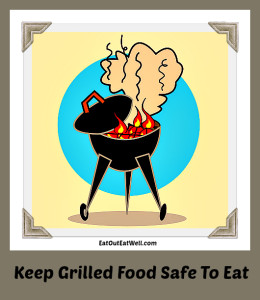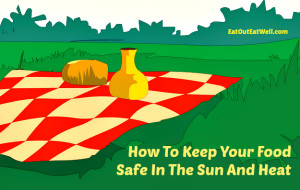 Summer means grilling and barbecue for lots of people. It’s hard to resist juicy burgers, sizzling steaks, fish seared to perfection, and frankfurters crackling and popping and screaming for mustard and relish or sauerkraut.
Summer means grilling and barbecue for lots of people. It’s hard to resist juicy burgers, sizzling steaks, fish seared to perfection, and frankfurters crackling and popping and screaming for mustard and relish or sauerkraut.
The food may taste great, but picnics, barbecues, and grilling can create the perfect environment for the bacteria that already reside in food to rapidly multiply and become the cause of a foodborne illness.
It’s really important to follow safe food handling rules when you’re cooking perishable foods like meat, poultry, and seafood and Unfortunately, it’s way too easy to get a little lax about following food handling rules when the grill takes center stage.
Some Grilling Guidelines
- Always wash your hands with soap and water before and after you handle the food. Did you pick up the raw burger or the piece of fish or chicken with your fingers to put it on the grill?
- When you marinate your food, let the food sit in the marinade in the refrigerator — not the counter — or even worse, in the sun next to the grill. Don’t use the marinade that the raw meat or poultry sat in on the cooked food. Instead, reserve part of unused marinade to baste with or to use as a sauce.
- Get those coals hot. Preheat the coals on your grill for 20 to 30 minutes, or until they are lightly coated with ash. If you’re using a gas grill, turn on the grill so it has enough time to thoroughly heat up.
- When the food is cooked, don’t put it on the same platter that you used to carry the raw food out to the grill. Ditto for the tongs and spatula unless they’ve been washed first in hot, soapy water. Reusing without washing can spread bacteria from the raw juices to your cooked or ready-to-eat food. Bring a clean platter and utensils with you to the grill and remove the ones that the raw food has been on – it’s too easy to mistakenly reuse the raw food ones.
- When grilled food is “ready” keep it hot until it’s served by moving it to the side of the grill rack, just away from the coals or the gas burner. This will keep it hot but prevent it from overcooking. If you reheat food, make sure it reaches 165°F.
- Cook only the amount of food that you think people will eat. It’s easy to cook more, but it’s a challenge to keep leftovers at a safe temperature. Throw out any leftovers that haven’t stayed within the safe temperature range.
- Use a food thermometer (make sure you have one at home and one to pack for grilling at picnics) to be certain that the food reaches a safe internal temperature. The FDA recommends:
- Steaks and Roasts: 145 degrees F (medium rare), 160 degrees F (medium)
- Fish: 145 degrees F
- Pork: 145 degrees F
- Ground beef: 160 degrees F
- Egg dishes: 160 degrees F
- Chicken breasts: 165 degrees F
- Whole poultry: 165 degrees F
- Shrimp, lobster, and crabs: cook until pearly and opaque
- Clams, oysters, and mussels: cook until the shells are open
HCAs and PAHs: Two Dangerous Compounds That Can Form
Unfortunately, two types of cancer causing compounds can increase or form in some foods that are grilled or cooked at high heat.
Heterocycline amines (HCAs) increase when meat, especially beef, is cooked with high heat by grilling or pan-frying. HCAs can damage DNA and start the development of cancer. Most evidence connects them to colon and stomach cancer, but they may be linked to other types of cancer, too.
Polycyclic aromatic hydrocarbons (PAHs) increase with grilling because they form in smoke and can get deposited on the outside of your meat.
Five Things You Can Do to Decrease HCAs and PAHs:
- Cook or fry at lower temperatures to produce fewer HCAs. You can turn the gas down or wait for charcoal’s low-burning embers.
- Raise your grilling surface up higher and turn your meat very frequently to reduce charring, which is highly carcinogenic. Grilling fish takes less cooking time and forms fewer HCAs than beef, pork and poultry.
- Marinate your meat. According to the American Institute for Cancer Research, marinating can reduce HCA formation by as much as 92 to 99%. Scientists think that the antioxidants in marinades help block HCA formation.
- Add some spices and rubs. Rosemary and turmeric, for example, seem to block up to 40% of HCA formation because of their antioxidant activity. A study by Kansas State University found that rubbing rosemary onto meat before grilling greatly decreased HCA levels. Basil, mint, sage, and oregano may be effective, too.
- Select leaner cuts of meat and trim excess fat to help reduce PAHs. Leaner cuts drip less fat – and dripping fat causes flare-ups and smoke which can deposit PAHs on your food.



